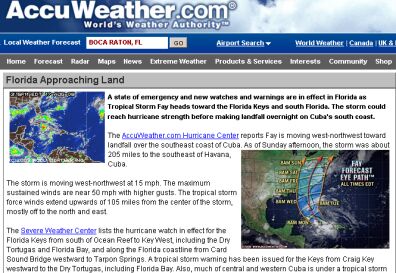I don’t have to decide today–it looks like it will still be far enough away tomorrow morning, with a better track, to make the decision then. Right now, I’m inclined not to, even though we’re still in the uncertainty cone (but over at the eastern edge of it). Most of the models, other than GFDL, have the thing out in the Gulf or along the west coast of the state. We are on a tropical storm watch on the east coast from Jupiter south, but that’s all.
The best outcome overall (other than completely falling apart) would be for it to come up through the swamp and run up the middle of the state, where it would weaken pretty quickly. If it stays out in the Gulf and hits farther north, it could intensify and really pound wherever it comes ashore. Either way, though, barring some dramatic shift in conditions, it looks like we’re in for rain and tropical-force winds, at worst, over here on the east coast. That’s a lot better than it looked a few days ago, when it looked like it might have come right at us through the Bahamas.
[Early afternoon update]
Well that’s good news. Jeff Masters says that this won’t be another Charley, despite the similarity in track. One thing that I notice a lot of the weather people talking about are the sea surface temperatures, but they are ignoring the fact that the upper-level winds aren’t that favorable for intensification.
[Update at 4:30 PM EDT]
The latest model run (2 PM) has moved it farther to the west, which is bad news for the panhandle, but good news for south Florida. Unless they’re all wrong, this thing isn’t heading to southeast Florida, and we may not even get much in the way of wind, though we could use the rain. There’s actually an outer band moving through Miami-Dade on the radar right now. Hope it makes it up through Broward and into south Palm Beach County.
[5 PM update]
Heh. The headline of one of the stories over at Accuweather is “Florida Approaching Land.”

A lot of people who bought swampland down here probably wish that it would do it faster. Now, if they could just give the place a few mountains. Or even hills.
In “The Swamp ” (an excellent history of south Florida) the author quotes an early settler who reportedly said, “I’ve bought land by the acre, and land by the foot, but by God, this is the first time I’ve ever bought land by the gallon.”
” (an excellent history of south Florida) the author quotes an early settler who reportedly said, “I’ve bought land by the acre, and land by the foot, but by God, this is the first time I’ve ever bought land by the gallon.”
Obviously, it was supposed to be “Fay,” not “Florida.”
[Update a few minutes later]
That was quick. Good thing I caught the screenshot. It now says “Fay Approaching Land.”
[Update about 6 PM EDT]
OK, it looks like shuttering tomorrow is definitely off the table. The track, per the models I described above, no longer has us even within the cone. I expect some wind and rain (which we need) but nothing more at this point. The only preparation I did this weekend was to fill up the tank of the car, and it looks like that’s all I’m going to do for Fay.
But the hurricane season is still young, and we’re heading into the heart of it. It’s particularly problematic because I’m going to be in LA for the last week of August and the first week of September, which is one of the highest-probability times for major storms here. I may have to shutter up before I leave, just as a precaution.
[Update a half hour later]
The first squall line from the storm is approaching. Unfortunately, I don’t have a camera handy, but it’s looking ugly to the south, and the winds are picking up (and the local radar confirms it). We just put in a new tree, which needs watering every day. I’ve put off doing it all day, in anticipation of this.
[Tuesday morning update]
We didn’t actually get much rain from that squall line last night, but about 8:30 this morning, the heavens opened up. The rain’s been hard and steady for an hour now. Guess I didn’t need to water that satin leaf.
I should note that Brendan Loy’s Weather Nerd blog is the go-to place for blogging the storm.
As he notes, it’s kind of good news, bad news. The good news is that it’s shifted eastward, and will hit Florida sooner, which means it won’t have much time to develop. The bad news (for me) is that it will affect the east coast much more than anticipated. Hope I won’t regret not shuttering, because it’s too late to do so now, unless I want to attempt it in wind and rain. The rains have come sooner than I expected, and a wind gust has already blown off a down spout that I hadn’t properly tied to the wall. If I get a break, I might try to fix it later today, though it’s not a big problem–just blasting water against the front wall.
